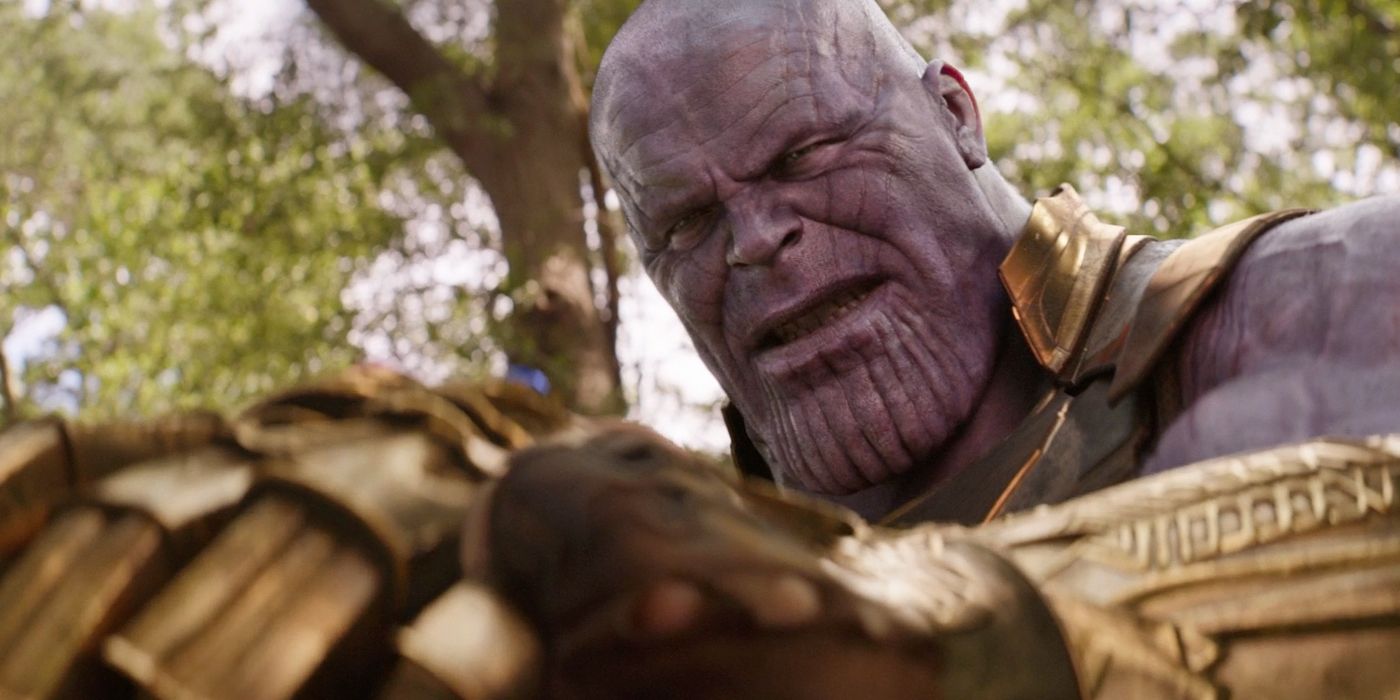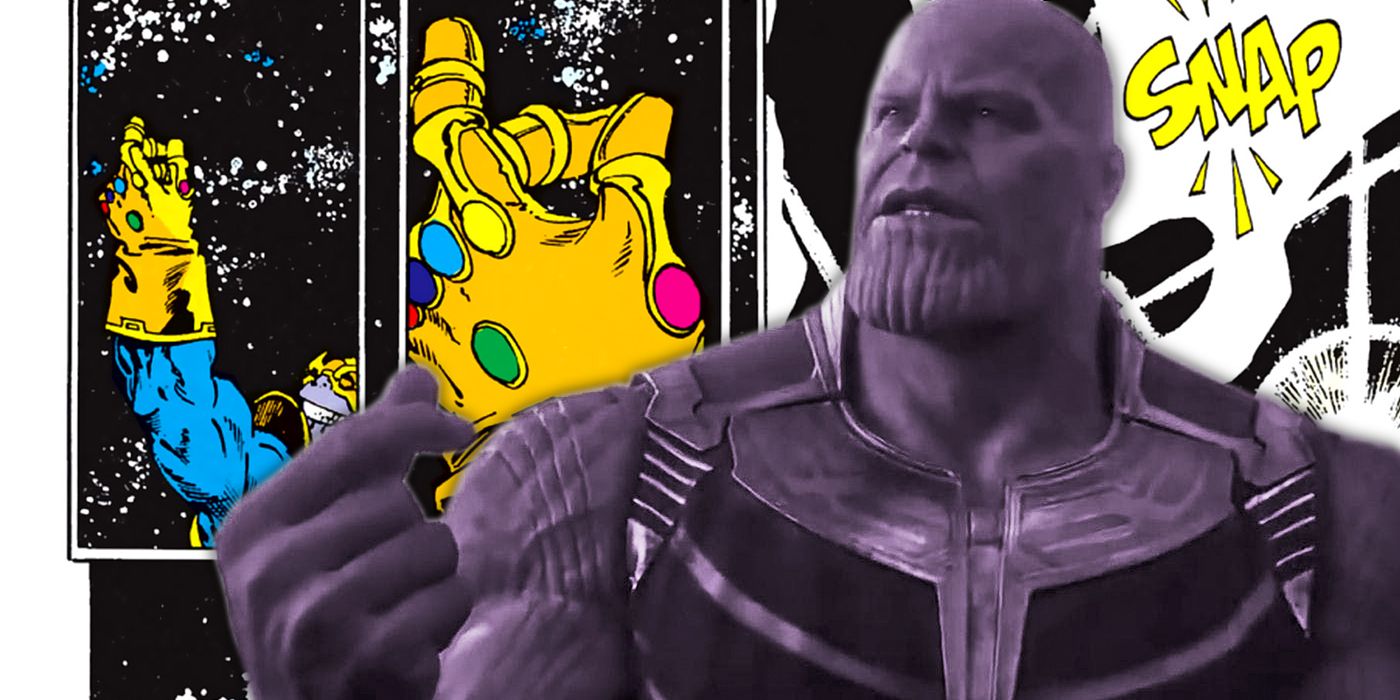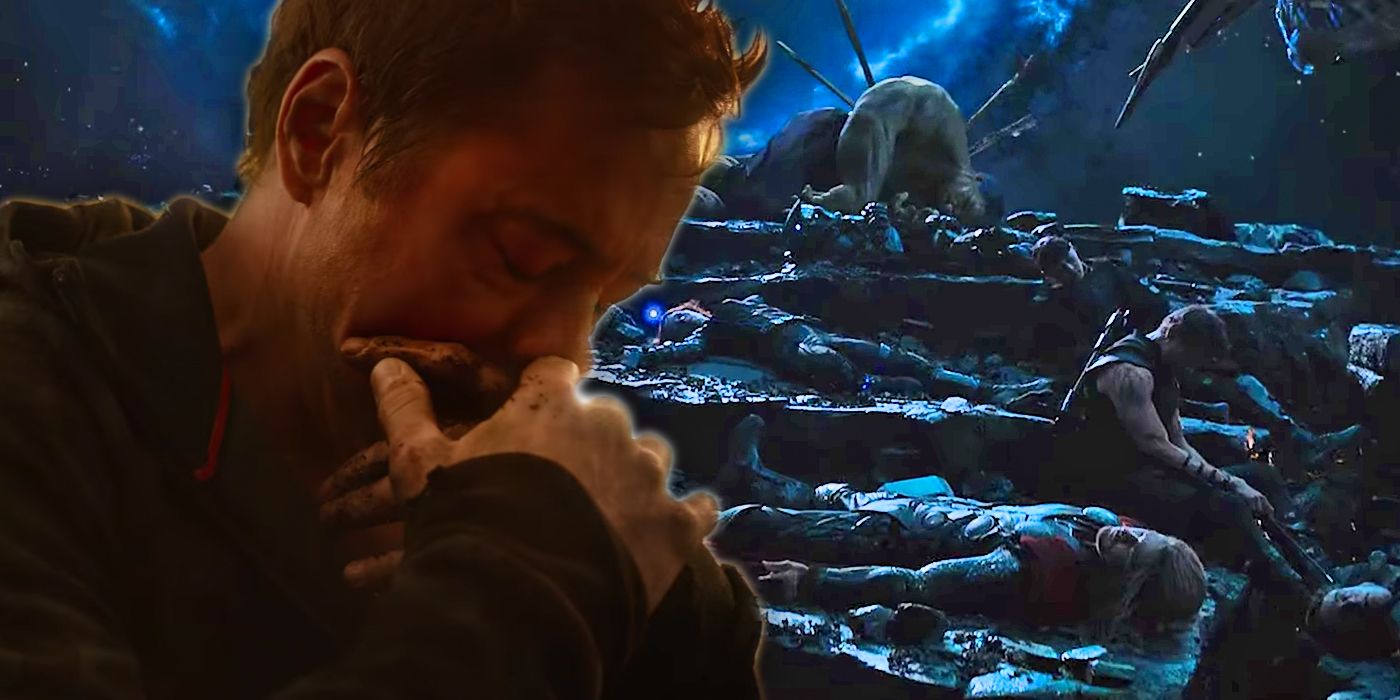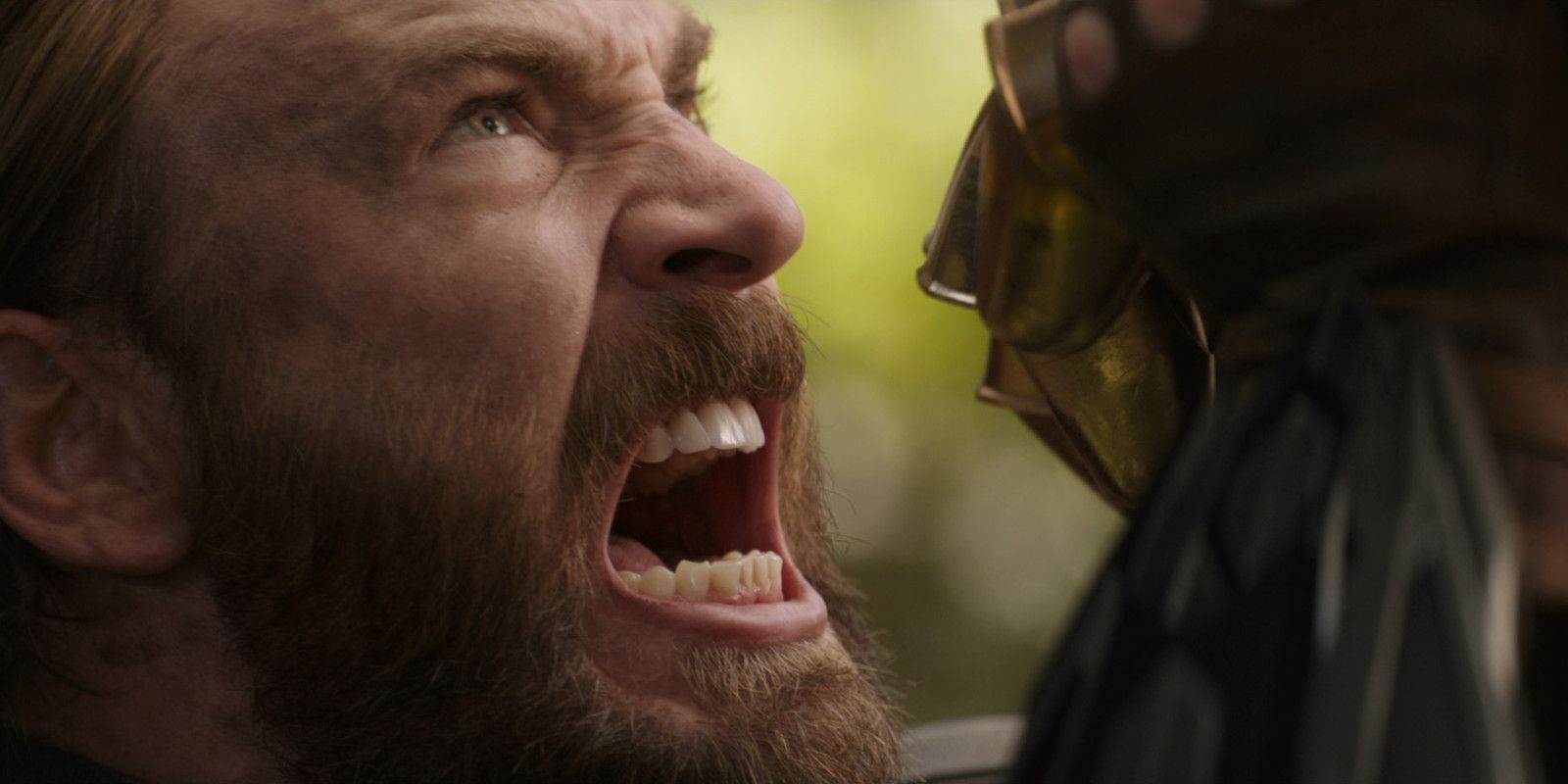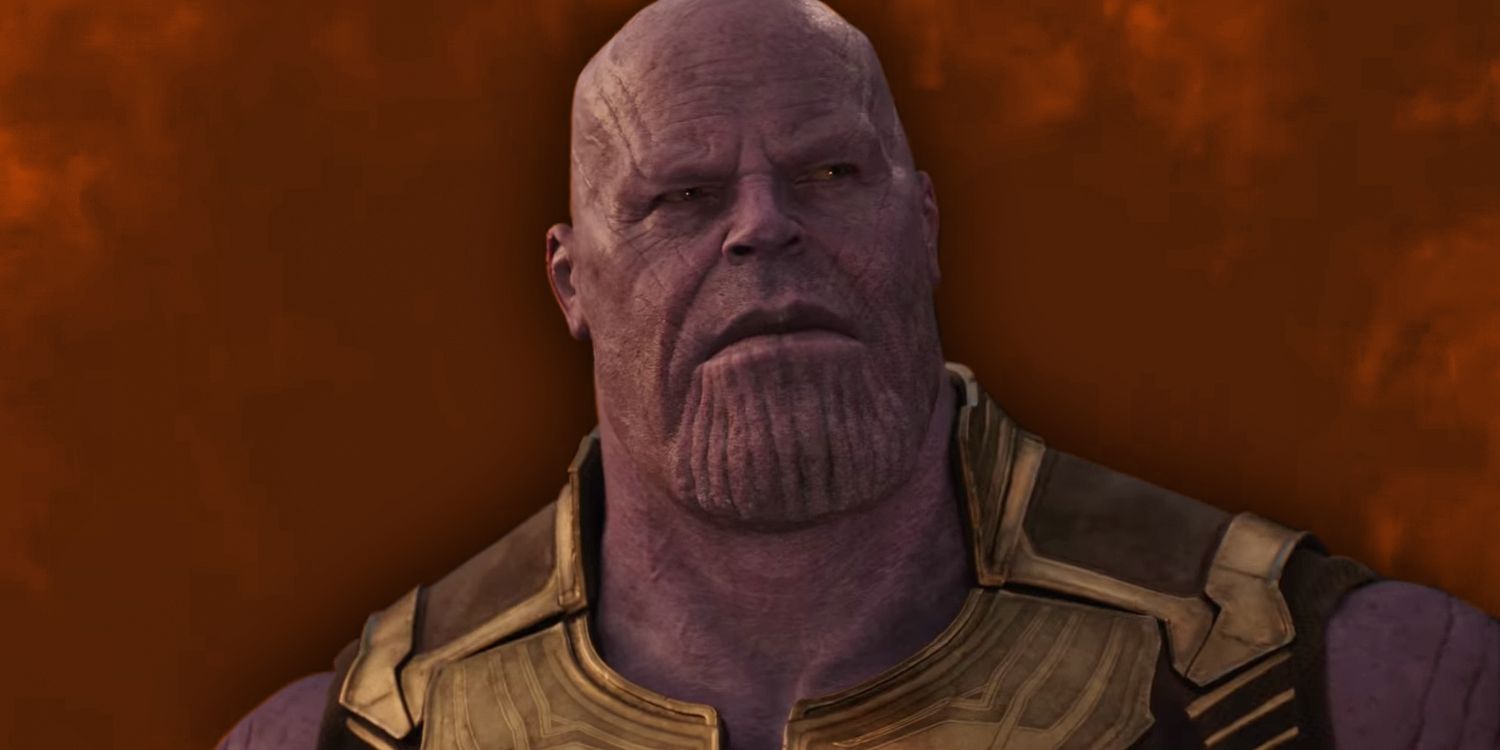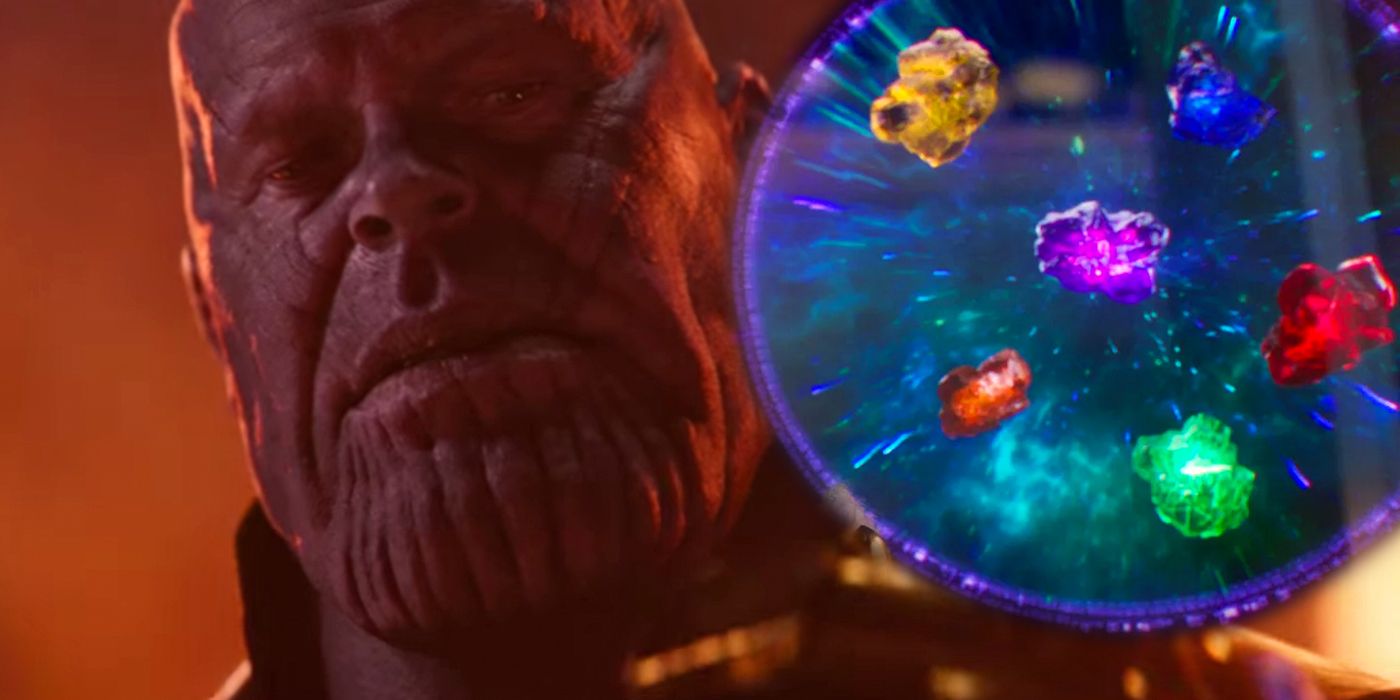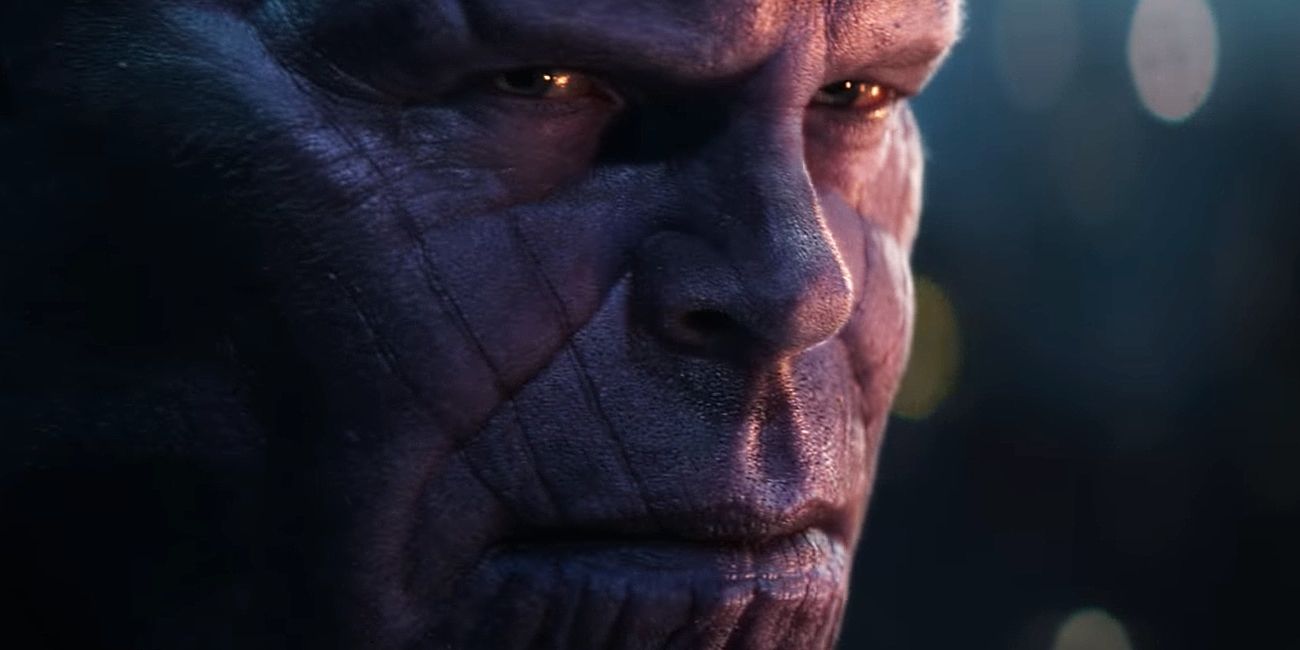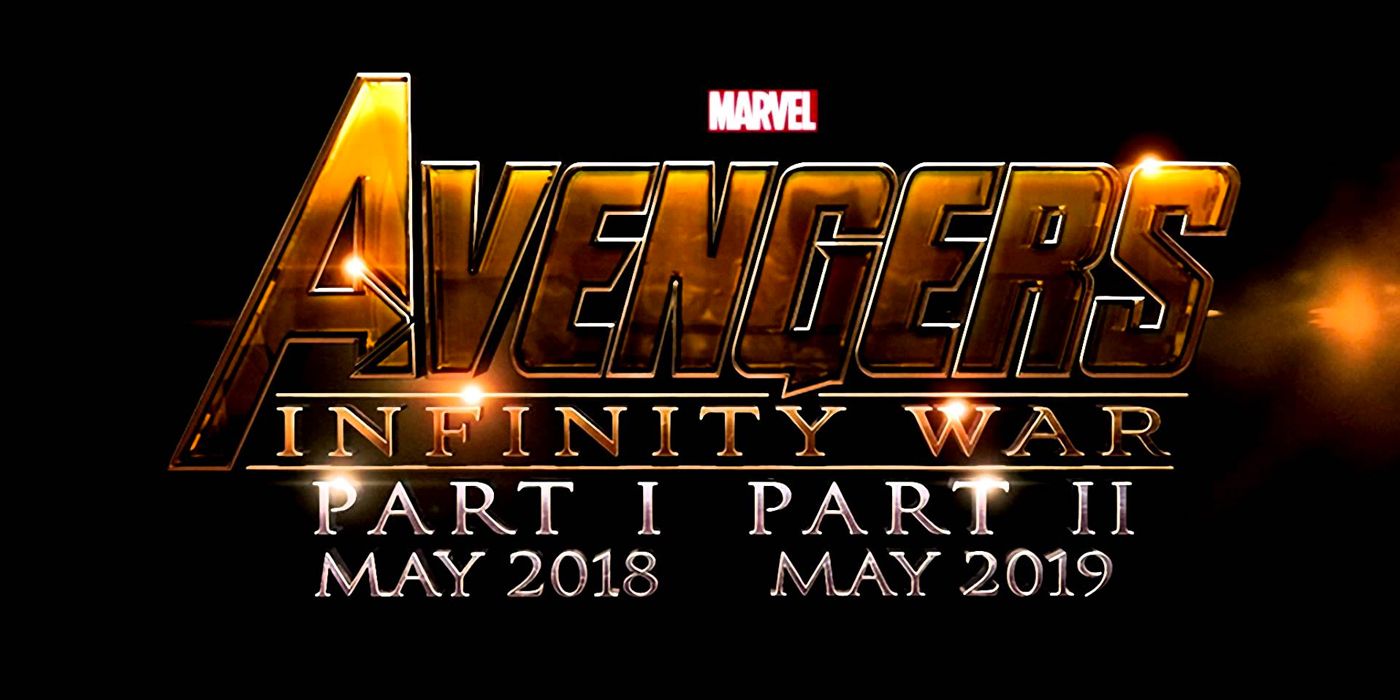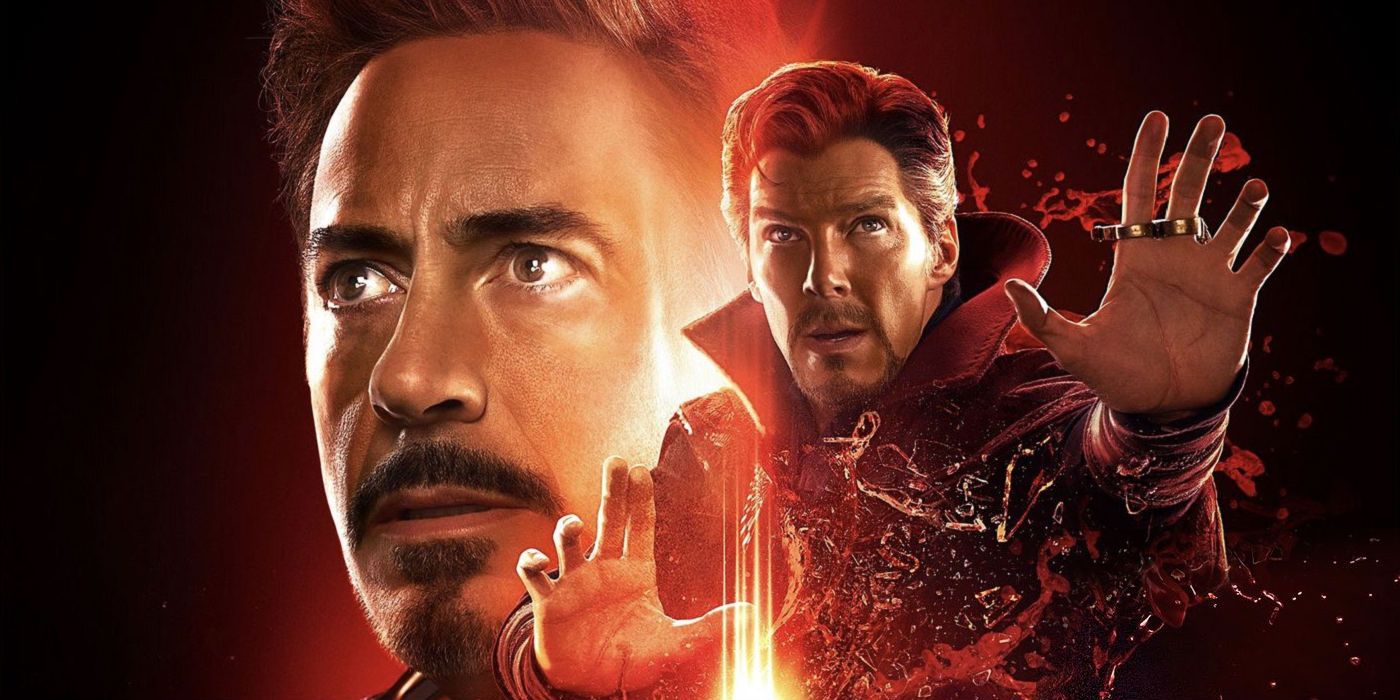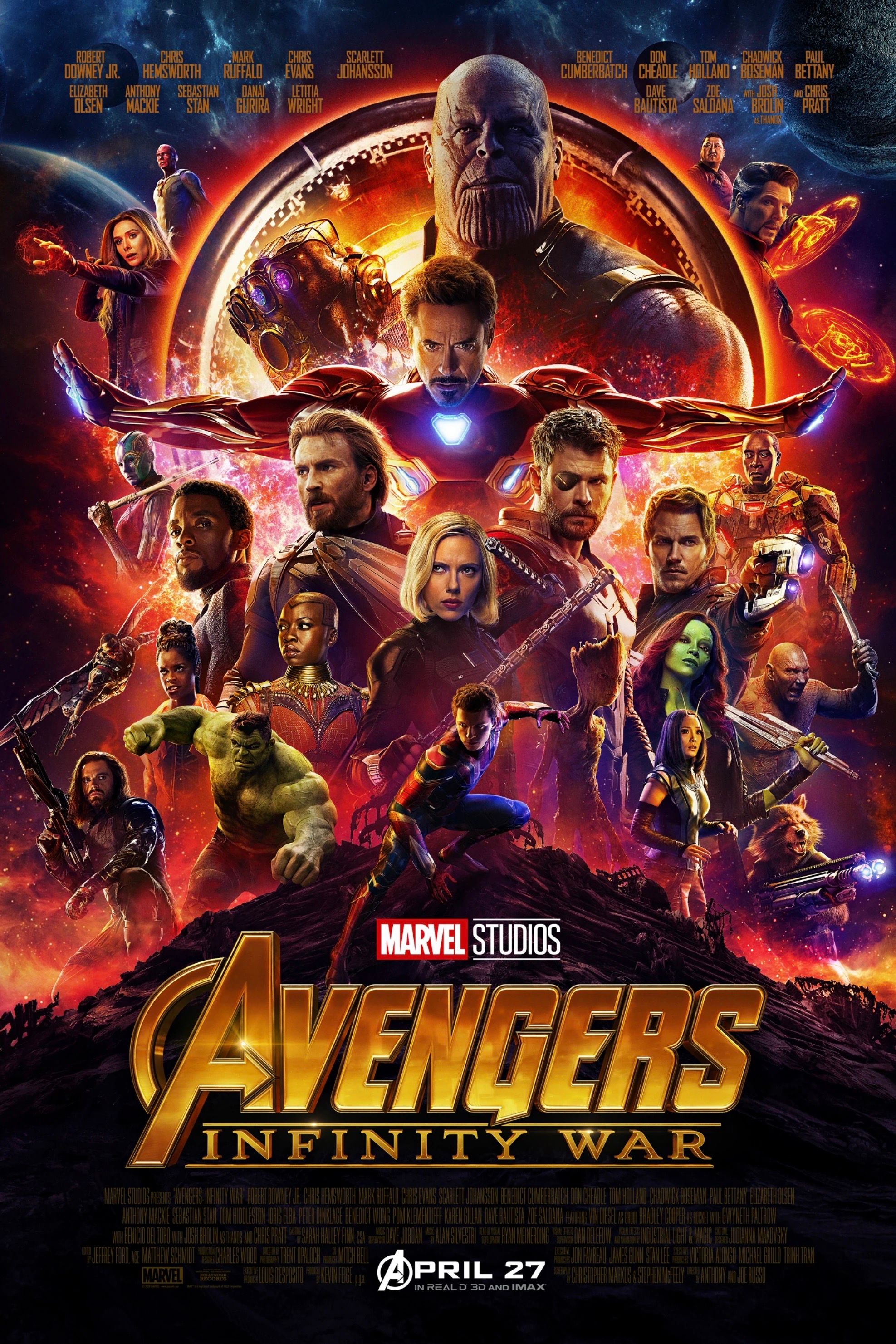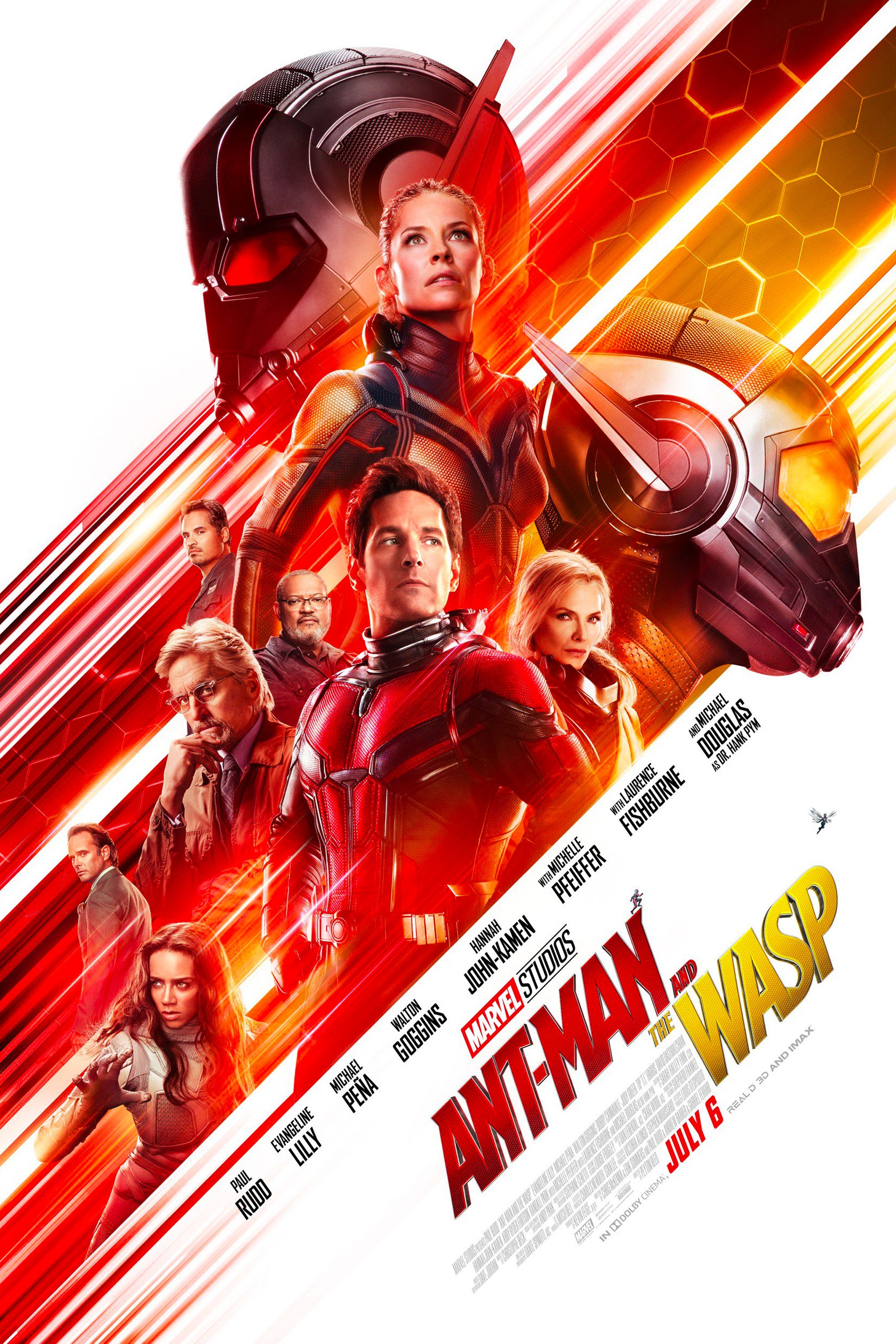Major spoilers for Avengers: Infinity War.
-
Avengers: Infinity War has one of the most shocking endings of not just the MCU, but the entire superhero genre. Today we're going to break down how that cliffhanger came to be and what it means for Marvel movies going forward.
As the marketing has made heavily clear, Infinity War is everything the ten-year Marvel Studios experiment has been building up to, dubbed repeatedly as a "culmination". Narratively, that's obvious. The film follows Mad Titan Thanos on his mission to collect the six Infinity Stones to wipe out half of the universe, a quest that's been hinted since Thor in 2011 and been the explicit end goal since Infinity War - Part 1 was announced in 2014.
Related: Avengers: Infinity War Corrects Marvel's Broken Timeline
Yes, that's right: Part 1. Culmination also implies climax, and so Thanos couldn't just be dispatched like any generic Marvel villain (of which there's been a lot). The solution that Kevin Feige and the Russo brothers found was to do it over two movies, leaving us with one heck of a deadly cliffhanger at the end of Avengers: Infinity War. Here's what happened, how it links to the comics, what it really means, and where we go from here.
- This Page: Thanos' Finger Snap
Thanos' Finger Snap
Thanos wanted to collect the Infinity Stones for an altruistic purpose: kill half of all life to save the universe. The strife of overpopulation was what he deemed the ultimate barrier to progression, something he'd already witnessed on his homeworld of Titan, and so he went planet-to-planet enacting his wrath. However, the Infinity Stones provided a shortcut; collect all six and he could do it with a snap of his fingers.
As promised in the pre-release hype, collecting the Stones came with sacrifice: the Power Stone led to the sacking of Xandar; the Space Stone the death of Loki and half of Asgard; the Reality Stone the (presumed) death of the Collector; the Soul Stone Thanos' murder of his favorite daughter Gamora; the Time Stone the seeming breaking of Doctor Strange's oath; and the Mind Stone the murder of Vision. However, while many had assumed it was a sacrifice on the Avengers' part, this seems to take more of a toll on Thanos, with each Stone meaning something greater to him. Gamora is obvious, but both Power and Space see him correcting his ego-driven plans from previous movies (Guardians of the Galaxy and The Avengers respectively), Reality has him kill Elder The Collector, Time us not killing Tony Stark, and Mind the destruction of his own purpose.
Whatever the torturous method, Thanos gets all the Infinity Stones in Wakanda and despite the best efforts of Thor and his new weapon, clicks his fingers. Thanos wins and half the universe dies. The End.
Read More: Avengers: Infinity War's Ending Was Very Different In The Comics
The snap is an iconic moment in the comics from the Infinity Gauntlet arc, in that case as a move by Thanos to impress his paramour Lady Death, and has evidently greatly informed the movie Infinity War, with Thanos likewise killing half of all life with a click. This means that while this is certainly shocking, it has some degree of expectancy. Indeed, what's so interesting is that this is a lot more faithful a take on Thanos' snap than many theories suggest; in the comic, the snap isn't a cliffhanger, rather the inciting incident halfway through the first issue - and given Avengers 4 is coming, the same seems true here; it's the start of a bigger story. Before we get to that, though, first we need to do a death count.
Half The Universe (And Avengers) Die
After Thanos Space Stones out of Wakanda, the Avengers in both the African nation and on Titan are left in a state of shock. At first, everything's OK, but then Thanos' plan is enacted: people begin to move slowly, feeling strange, before fading away into dust. Half of the universe dies. Of the core heroes, Bucky, Black Panther, Groot, Scarlet Witch, Falcon, Star-Lord, Mantis, Drax, Doctor Strange, and Spider-Man all disappear (as well as Nick Fury and Maria Hill in Infinity War's end-credits scene), with mass disintegration seen also on the Wakandan battlefield.
This leaves a very small Avengers team behind: Captain America, Black Widow, Thor, Bruce Banner, War Machine, Okoye and M'Baku are the only survivors confirmed on Wakanda, with only Tony Stark and Nebula on Titan. Essentially, the numbers have been shaved down the original core heroes from The Avengers, along with War Machine (who was also present in Phase 1), Nebula, Okoye and M'Baku.
Due to not being shown after the snap, we don't know the status of Shuri or Wong, neither do we know what's happened to absentees Hawkeye, Ant-Man, Wasp or any of their related characters (although given the fellow Phase 1 survivors, Clint seems safe). One unseen hero who does seem to have made it through is Carol Danvers aka Captain Marvel, who responds to Nick Fury's page in the end-credits scene.
MCU Theory: Captain Marvel Is In An Alternate Timeline
What The Avengers' Deaths Really Mean
While half of the cast dies, providing murder of characters on a scale that makes Rogue One: A Star Wars Story look restrained by comparison, the grand purpose of these deaths isn't anything of permanence. After all, most of these characters are coming back; Spider-Man, Guardians of the Galaxy and Black Panther all have sequels in development, while Bucky and Doctor Strange are too integral to the future of the MCU to be wiped away with the movement of two fingers (and it's possible those lost along the way like Gamora could also return).
This impermanence has often been a problem for Marvel, yet it works here because the purpose is different. Whereas in the past the movies were trying to make you genuinely think characters were gone for good despite knowledge of narrative or behind-the-scenes concerns challenging many's suspension of disbelief - think Nick Fury's passing death fakeout in Captain America: The Winter Soldier long before Samuel L. Jackson's initial contract was up - here it's more obviously about the in-the-now emotion making way for a new story.
Sure, there is a premium on tragedy. We start with Bucky, who Captain America has fought three solo movies to protect, vanishing right in front of him, then have a multitude of characters we've got to know since the original Avengers fade away - including a bemused Groot - culminating in a terrified fifteen-year-old begging his helpless surrogate father figure to save him. The entire movie operates with some degree of shorthand - Wakanda wouldn't make much sense if we hadn't been introduced to the country in Black Panther two months prior - but here it becomes an asset, allowing each disappearance leave an impact. The saying goes that one death is a tragedy, a million is a statistic - yet Infinity War makes you feel every one.
But that isn't the long-standing purpose. Infinity War isn't pretending to be anything final. What makes the death so heartwrenching is that they come after the heroes should have won - they destroyed the Mind Stone and stabbed Thanos - and it's juxtaposed against the victory of a villain who we nevertheless understand - and there's still a glimmer of optimism. As the devout Captain America blasphemes, "Oh God."
What Happens To Thanos At The End of Avengers: Infinity War?
Immediately after the snap, Thanos is transported to a strange, ethereal realm bathed in orange. The only structure here is an upsidedown-world version of the gazebo where he first met Gamora, and sat there is what appears to be his younger daughter. They have a brief, muted exchange where Thanos begins to grasp his victory, although the conviction that previously defined him feels absent:
Gamora: Did you do it?
Thanos: Yes.
Gamora: What did it cost?
Thanos: Everything.
It's not explicitly stated in the movie, but this would appear to be Soul World; in the comics, a dimension inside the Soul Stone where the souls "captured" by it reside. Given the orange landscape and presence of the daughter he sacrificed to capture that very Stone, it would fit as a movie approximation, with Thanos going there after the snap to reunite with his lost child. Whether this is simply intended as a window into his own soul, highlighting how much of himself he's lost, or setting it up as a key location in Avengers 4 (possibly where Gamora is trapped), is unclear.
After leaving young Gamora, Thanos teleports out of Wakanda, leaving the Avengers to feel the aftermath of his victory. We next see him in the film's very last scene, on a verdant planet living in rustic isolation. This is, weirdly, a nod to his farming days in the comics, but more purely a stamp on the movie; he sits in silence and smiles. It's over.
What Happens To The Infinity Stones & Gauntlet?
Thanos' victory leaves many questions, including the status of the Infinity Gauntlet. After the snap, the golden glove is cracked and cindered, although as Thanos is able to use the Space Stone to escape it evidently still works and allows him to wield their near-uncontrollable power. This further presumably means that, at the very end of the film, he has the Stones in his possession, or at the very least knows where they all are. The fact he's recovered from Thor's Stormbreaker attack indeed indicates he's used on to heal himself. He's going to need them, as however the Avengers hope to undo his wrath, at least some of them will be important.
Related: What Happens To The Infinity Gauntlet After Infinity War?
That so much of that is speculation is curious; after spending an entire movie focused on collecting them, Avengers 3 loses all interest in the Infinity Stones the moment Thanos snaps. Of course, that does make some story sense; our protagonist no longer cares about them either...
Thanos' Victory Is Broken
Thanos is relatable. That may be the most shocking part of Avengers: Infinity War. He's not quite Killmonger, who was in many ways right in Black Panther (albeit warped), but across the citing of his motivations and the conflict he must go through to win, you begin to empathize with the Mad Titan. The Russos have long said that Thanos was the protagonist of Infinity War, and that's very true; to the point he's the character whose return is promised at the very end of the credits. While the film does focus on the heroes' conflict of duty and friendship - especially in relation to the protection of their two Stones, with Steve Rogers and Doctor Strange both forced to address they allegedly unshakable beliefs - most of its thematic ground is in Thanos.
As already discussed, the sacrifices made for the Infinity Stones are not to the Avengers, but to him. His goal is massive, and the toll greater; he must undo his past in destroying Xandar and Loki, lose what's close to him with Gamora, deal with his foes for the Time Stone and actually address what his true purpose is with the Mind Stone. Each one is a pointed step in deconstructing Thanos (presumably why the Power Stone is skipped over - it repeats what we get with the Space Stone) and making him question his mission - with the conclusion that it is truly worth it.
But was it? The final Gamora scene is tinged not with victory but regret. Thanos himself says he will be at peace when he snaps, and he ends with a trademark grin, but the movie points otherwise. Has he sold too much of himself for his goal? Is the peace at the end a reward or broken? And was victory really the point? There are flaws in his vague logic, as raised by the people of Titan - killing half the population doesn't directly lead to peace - and the ending makes clear it was the journey that drove him. After victory, there's nowhere to go.
Related: How Avengers: Infinity War Was The Most Secretive Movie Event Ever
Of course, that's not the only way it's not necessarily a victory for him. We are entering the endgame, after all.
Infinity War Is Just Part 1 Of The Story
When it was first announced, Infinity War was a clearly-titled two-parter; in October 2014, Marvel announced their entire Phase 3 slate, with Infinity War Part 1 in May 2018 and Part 2 a year after. That changed about two years later, with the first simply Infinity War and Avengers 4 now untitled, with all involved coy about how they connect; they were still shooting back-to-back and seemingly part of the same story, yet the PR line was that they were clearly delineated. This led many to believe Avengers 3 was about the Infinity Gauntlet, with the fouth telling another story (Secret Invasion was a popular pick after the Skrulls were confirmed for Captain Marvel).
However, based on the ending of Infinity War, it doesn't look like much actually did change beyond the names (done presumably because "Part 1" isn't the best sell): Thanos winning is surely the originally envisioned break point, with only less pivotal story specifics (like the prominence of the Guardians and presence of Spider-Man) shifting majorly. And thus what we have is just one half of the story.
Half is right too, because while the next two movies between now and Avengers 4 are definitely going to link into this finale, they're both in the past: Ant-Man & The Wasp takes place in the aftermath of Captain America: Civil War, coming out of Scott Lang under house arrest; Captain Marvel is set in the 1990s with a pre-eyepatch Nick Fury, with the biggest question being how she'll transition into the future.
Read More: The Next Two Marvel Movies Are Set Before Avengers: Infinity War
Beyond the impending arrival of Captain Marvel, established in the end-credits scene, when it comes to saying what we can expect from Avengers 4, things are tricky. The film never got a title after losing that Part 2, and it sounds like that won't be rectified any time soon. That said, Infinity War still provides a big clue to how the Avengers can still win the day.
Doctor Strange's Endgame Plan
The most confusing moment in the end stretch of Avengers: Infinity War is Thanos acquiring the Time Stone. He spends most of the movie trying to get it off Doctor Strange, who has sworn an oath to protect the Orb of Agamotto with his life and previously said he wouldn't hesitate in sacrificing Iron Man or Spider-Man to keep it out of the Mad Titan's hands. And yet when Tony gets stabbed and Thanos is about to deliver the killing blow, Strange interjects and gives up the Stone willingly, a move that allows the villain to subsequently get the Mind Stone and win.
While it's played plainly as Strange gaining compassion and valuing Tony, that's not really what's going on. As he says before vanishing, "there was no other way". Earlier, he saw 14,000,605 possible futures and only one where they won out: giving up the Time Stone - and allowing Quill to stop the earlier attempt at stopping Thanos - was Strange trying to ensure that single outcome, that 0.000007% possibility, comes to pass. When he says we're entering the "endgame", he doesn't mean the movie's final act, rather the MCU's, with that surrender essential in ultimate victory.
Now, it's likely that Stark has to remain alive for this to come to pass and so there is a measured element to Doctor Strange's decision coming when it does. However, given the nature of the villain's victory - the amount it cost him and the loss of purpose it leads to - it also seems that, on a grander scale, the only way to ultimately stop Thanos is for him to first win. Only when Thanos is devoid of all drive is he weak, and only when truly desperate can the Avengers win out. The future Strange has seen is torturous, even leading to his own death, but he fades away knowing that he's set the survivors on the path to victory.
Related: Avengers: Infinity War Solves The MCU's Biggest Problems
-
Avengers: Infinity War may end on an incredible down-note of a cliffhanger, with half the cast dead and all hope lost, but this isn't true victory for Thanos. He has lost so much and the heroes are emboldened. The Avengers will fight back against Thanos, and they will win. Because if they can't protect the universe, you can be damn well sure they'll avenge it.

